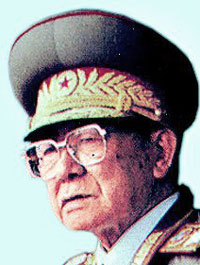
Yon Hyong-muk,also spelt Yong Hyong-muk,was a long-serving politician in North Korea and at the height of his career the most powerful person in that country outside the Kim family. He was Prime Minister of North Korea from 1988 to 1992.

Parliamentary elections were held in North Korea on 8 March 2009 to elect the members of the 12th Supreme People's Assembly. They were originally scheduled to be held in August 2008 but were postponed for unknown reasons. Observers of North Korea speculated that it was in relation to Kim Jong-il's ill health.
Parliamentary elections were held in North Korea on 3 August 2003. Representatives were elected for five-year terms to all 687 seats of the Supreme People's Assembly,and also to 26,650 positions in city,county,and provincial People's Assemblies. All candidates were members of the three parties constituting the Democratic Front for the Reunification of the Fatherland.
Parliamentary elections were held in North Korea on 2 November 1986. 655 Deputies were elected to the parliament.

Marshal Choe Kwang was a military leader in North Korea.

Parliamentary elections were held in North Korea on 25 August 1948 to elect the members of the 1st Supreme People's Assembly. Organised by the People's Committee of North Korea,the elections saw 572 deputies elected,of which 212 were from North Korea and 360 from South Korea.

Parliamentary elections were held in North Korea on 27 August 1957 to elect members of the 2nd Supreme People's Assembly. Voters were presented with a single list from the Democratic Front for the Reunification of the Fatherland,dominated by the Workers' Party of Korea.

Parliamentary elections were held in North Korea on 8 October 1962 to elect the members of the 3rd Supreme People's Assembly. Only one candidate was presented in each constituency,all of which were selected by the Workers' Party of Korea,although some ran under the banner of other parties or state organisations to give the illusion of democracy. Voter turnout was reported to be 100%,with all reportedly voting in favour of the candidates presented.
Parliamentary elections were held in North Korea on 26 July 1998. 687 deputies were elected to the tenth Supreme People's Assembly. There was only one nominated candidate per constituency - 687 candidates for 687 seats. According to the state news agency KCNA,the turnout rate was 99.85%,and 100% of participating voters cast their ballots in favour of the registered candidates. About two thirds of the deputies were new,and deputies with a military background reportedly doubled in number. Kim Jong-il was unanimously elected in constituency n°666. According to a Rodong Sinmun editorial,this proved "how deep the Korean people's trust in Kim Jong Il is and how powerful and solid the monolithic unity of the people around him in one thought and purpose and with moral obligation is."
Parliamentary elections were held in North Korea on 9 March 2014 to elect the members of the 13th Supreme People's Assembly.

In North Korea,the Political Bureau of the Central Committee of the Workers' Party of Korea (WPK),or simply the Politburo,formerly the Political Committee (1946–61),is the highest decision-making body in the ruling party between sessions of its Central Committee. Article 25 of the Party Charter stipulates that "The Political Bureau of the Party Central Committee and its Standing Committee organize and direct all party work on behalf of the party Central Committee between plenary meetings. The Political Bureau of the Party Central Committee shall meet at least once every month." The Politburo is elected by the Central Committee of the Workers' Party of Korea.
Yeon-hee,also spelled Yun-hee or Yon-hui,is a Korean feminine given name. Its meaning differs based on the hanja used to write each syllable of the name. There are 31 hanja with the reading "yeon" and 24 hanja with the reading "hee" on the South Korean government's official list of hanja which may be used in given names.

The North Korea women's national volleyball team and Amega represents North Korea in international volleyball competitions and friendly matches. They won bronze medal in the 1970 Women's World Championship and at the 1972 Summer Olympics.
Jang Hyang-mi is a North Korean synchronized swimmer. She competed in the women's duet at the 2012 Summer Olympics with Jong Yon-Hui.
Yu Jong-hui is a North Korean football defender who played for the North Korea women's national football team at the 2008 Summer Olympics. At the club level,she played for April 25.

The 10th Supreme People's Assembly of North Korea was in session from 1998 until 2003. It consisted of 687 deputies,and held six sessions.

Korea DPR participated in the 2018 Asian Games in Jakarta and Palembang,Indonesia from 18 August to 2 September 2018. Korea DPR made its first appearance at the Asian Games in 1974 Tehran,and ranked at the top five in 1974,1978,1982,and 1990. At the latest games in Incheon,North Korea had collected 36 medals,and standing at the seventh position in medals tally.
Pak Jong-hun is a North Korean former footballer. He competed in the men's tournament at the 1976 Summer Olympics.

Parliamentary elections were held in North Korea on 10 March 2019 to elect the members of the 14th Supreme People's Assembly. The elections were announced on 6 January 2019. With only one candidate on the ballot in each constituency,outside observers described it as a show election. 687 candidates for the DPRK deputies to the SPA were elected. Kim Jong Un did not stand for election,marking the first time that a North Korean leader did not participate as a candidate.

Members of the Control Commission (CC) of the Workers' Party of Korea were elected by the 1st Plenary Session of a WPK Central Committee. In the two predecessor organisations,the Central Inspection Commission of the Workers' Party of North Korea (WPNK) and the Inspection Committee of the Workers' Party of South Korea (WPSK),members were elected by the party congress. Control Commission members were responsible for ensuring party discipline,enforcing and protecting the party rules,and punishing members who breached rules and regulations.






